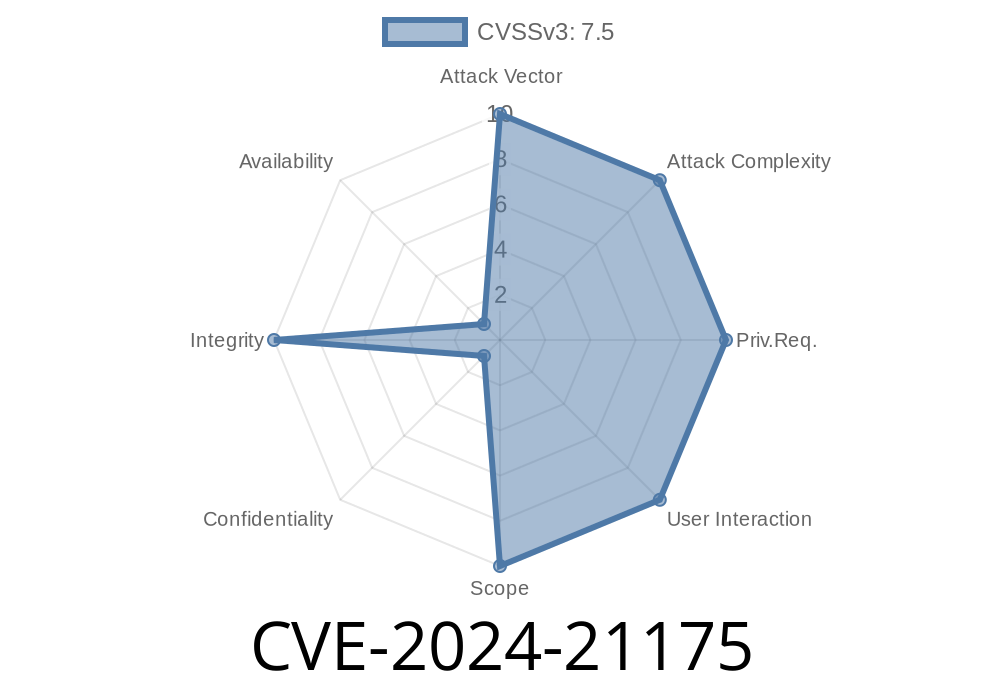Published: June 2024
CVSS 3.1 Base Score: 7.5 (High Risk)
Components Affected: Oracle WebLogic Server (Core Component)
Versions Affected: 12.2.1.4. and 14.1.1..
Attack Vector: Network (HTTP, unauthenticated)
What is CVE-2024-21175?
CVE-2024-21175 is a recently announced vulnerability in the core component of Oracle WebLogic Server, which is part of Oracle Fusion Middleware. This bug specifically threatens *data integrity*, giving remote attackers the power to create, delete, or modify any data exposed by the WebLogic Server — all without authentication.
If you’re running WebLogic Server version 12.2.1.4. or 14.1.1.., your system is at serious risk. Let’s break down what this means and how attackers can exploit it.
How Bad Is It?
This vulnerability is easily exploitable. According to Oracle (and independent security research), an attacker only needs to send a crafted HTTP request over the network to compromise the server. No login is needed! There is also no need for user interaction or any special configuration.
CVSS Vector:
(CVSS:3.1/AV:N/AC:L/PR:N/UI:N/S:U/C:N/I:H/A:N)
I:H – High integrity impact
In simple terms:
If you have this server exposed to the internet and unpatched, anyone can potentially change, destroy, or forge any data managed by your WebLogic instance.
Exploit Details: What Does the Attacker Do?
Oracle is keeping details restricted, but here's how these “easily exploitable” WebLogic bugs often work:
The vulnerable Core component misprocesses the request.
3. The attacker can then *create, delete, or modify* important data, such as configuration files, user accounts, or application data.
Example Exploit Scenario (Hypothetical Proof of Concept)
Let's say the vulnerable URL is /weblogic/data and accepts parameters as JSON. An example Python snippet might look like this:
import requests
# Target server and endpoint
url = "http://victim.example.com/weblogic/data";
# Malicious payload - modifies sensitive data
data = {
"action": "modifyData",
"targetField": "isAdmin",
"newValue": "true"
}
# Send the malicious request
resp = requests.post(url, json=data)
print(f"Status code: {resp.status_code}")
print(f"Response: {resp.text}")
> ⚠️ Note: The above snippet is a hypothetical example for *illustration* only. Oracle has not released the exact vulnerable endpoint or payload structure (for obvious reasons).
Patch Immediately:
Oracle released a patch for this bug in the April 2024 Critical Patch Update. Apply it ASAP.
Restrict Network Access:
Do not expose WebLogic admin interfaces to the public internet. Use VPNs, firewalls, or access controls.
References
- Oracle Security Advisory – CPU April 2024
- National Vulnerability Database Listing
- WebLogic Security Docs
Final Words
CVE-2024-21175 is a serious wake-up call for Oracle WebLogic Server users. Given how easy this vulnerability is to exploit, it’s critical to patch, restrict access, and monitor for malicious activity right now. Attackers can strike as soon as the bug is public knowledge—*don’t give them a chance*.
If unsure, reach out to your Oracle support contact or your local security team today.
*Stay secure!*
Timeline
Published on: 07/16/2024 23:15:21 UTC
Last modified on: 07/19/2024 13:35:41 UTC
